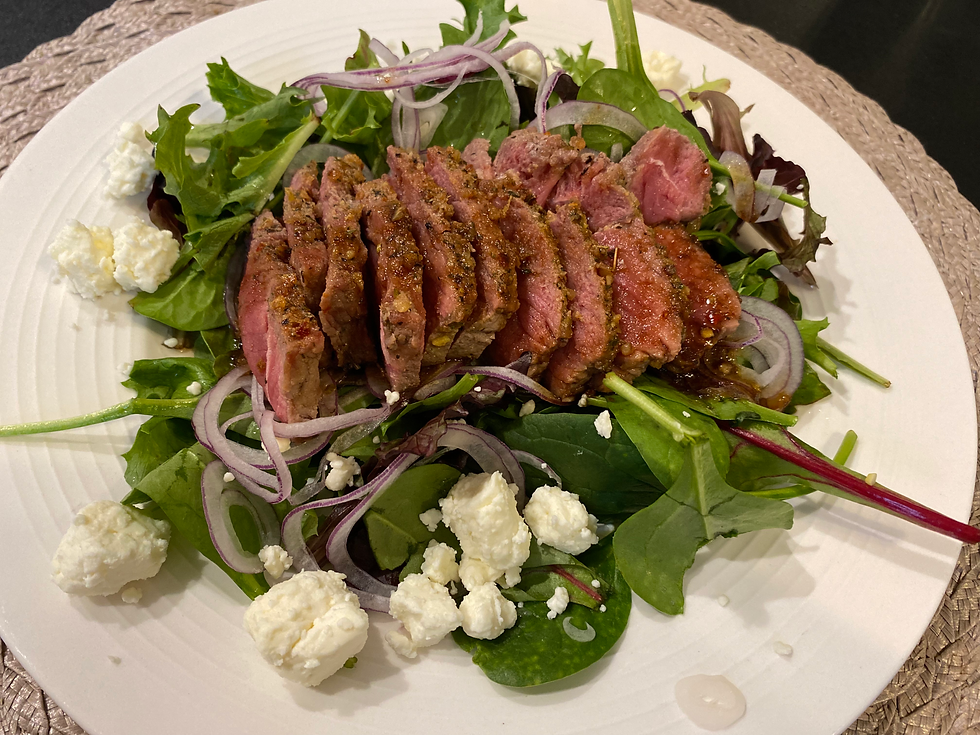
Vitamin B12
- Caregiver

- Aug 11, 2025
- 4 min read
Vitamin B12 is essential for nerve health, red blood cell production, and overall energy, which can help address issues like numbness in the hands if a deficiency is a contributing factor. Here are foods rich in vitamin B12, based on nutritional data and common dietary sources:
Animal-Based Foods (Highest B12 Content)
• Liver:
Beef or chicken liver is one of the richest sources (e.g., ~70-80 mcg per 100g of beef liver).
• Shellfish:
Clams (~84 mcg per 100g), oysters (~16 mcg per 100g), and mussels.
• Fish:
Sardines (~8.9 mcg per 100g), salmon (~3.2 mcg per 100g), tuna (~2.5 mcg per 100g), and mackerel.
• Meat:
Beef (~2.6 mcg per 100g), pork, and chicken (~0.3-0.6 mcg per 100g).
• Eggs:
Particularly the yolk (~1.2 mcg per large egg).
• Dairy:
Milk (~0.5 mcg per cup), cheese (e.g., Swiss, ~0.9 mcg per ounce), and yogurt (~1 mcg per 6 oz).
Fortified Foods (Good for Vegetarians/Vegans)
• Fortified Cereals:
Many breakfast cereals are fortified with B12 (check labels, ~0.6-6 mcg per serving).
• Nutritional Yeast:
Fortified versions can provide ~1-5 mcg per tablespoon.
• Plant-Based Milks:
Fortified soy, almond, or oat milk (~0.5-3 mcg per cup, varies by brand).
• Fortified Meat Substitutes:
Some veggie burgers or tofu products are fortified (check labels).
Notes:
• Daily Requirement:
Adults need ~2.4 mcg of B12 daily. Pregnant or breastfeeding women need slightly more (~2.6-2.8 mcg).
• Absorption:
B12 requires intrinsic factor (produced in the stomach) for absorption, so some people with digestive issues (e.g., pernicious anemia, gastritis) may need supplements or injections even with a B12-rich diet.
• Vegan/Vegetarian Diets:
Since B12 is naturally found in animal products, those avoiding animal foods should rely on fortified foods or supplements to prevent deficiency.
• Deficiency Signs:
Numbness, tingling, fatigue, or memory issues could indicate low B12, especially if you’re vegetarian, vegan, or have absorption issues.
Practical Tips:
• Incorporate foods like eggs or salmon into meals if you eat animal products.
• If vegetarian/vegan, check labels for fortified cereals or plant milks and consider a B12 supplement (consult a doctor for dosage).
• Pair B12-rich foods with a balanced diet to support nerve health ( leafy greens for folate, which works with B12).

Numb hands is a common issue and can have several possible causes. Here are some likely reasons, based on medical insights and common patterns:
1. Sleeping Position:
Sleeping with your hands or arms in an awkward position, such as under your body or bent at an odd angle, can compress nerves (like the median or ulnar nerve) or restrict blood flow. This can lead to temporary numbness or tingling, often called “pins and needles.” This is one of the most common causes and usually resolves after moving your hands.
2. Carpal Tunnel Syndrome:
This condition occurs when the median nerve, which runs through the wrist, is compressed. It’s more common in people who perform repetitive hand movements (e.g., typing) or have certain risk factors like pregnancy, diabetes, or obesity. Symptoms include numbness, tingling, or weakness in the hands, often worse at night or upon waking.
3. Peripheral Neuropathy:
Damage to peripheral nerves, often due to conditions like diabetes, vitamin B12 deficiency, or alcohol overuse, can cause numbness or tingling in the hands. This may be more persistent and not just limited to mornings.
4. Cervical Spine Issues:
Problems in the neck, such as a herniated disc or cervical spondylosis, can compress nerves that travel to the hands, causing numbness. This might be accompanied by neck pain or stiffness.
5. Poor Circulation:
Reduced blood flow to the hands, possibly due to conditions like Raynaud’s disease or simply sleeping in a way that restricts circulation, can cause numbness. Cold temperatures or tight bedding might worsen this.
6. Other Factors:
• Electrolyte Imbalances: Low levels of potassium, calcium, or magnesium can affect nerve function.
• Medications: Certain drugs, like those for chemotherapy or seizures, can cause peripheral neuropathy as a side effect.
• Injury or Inflammation: Recent injuries, arthritis, or tendonitis in the wrist or arm could contribute.
What You Can Do:
• Adjust Sleep Position:
Try to avoid sleeping with your hands under your body or head. A neutral wrist position (e.g., using a pillow to support your arms) may help.
• Stretch and Move:
Gently shake or stretch your hands upon waking to restore circulation.
• Evaluate Symptoms:
If numbness persists, occurs during the day, or is accompanied by pain, weakness, or other symptoms ( neck pain, cold fingers), it’s worth consulting a doctor.
• Lifestyle Factors:
Ensure proper hydration, a balanced diet (rich in B vitamins), and regular movement to support nerve health. If you do repetitive tasks, take breaks to stretch your wrists.
When to See a Doctor:
• Numbness lasts more than a few minutes after waking or occurs frequently.
• You experience weakness, pain, or loss of grip strength.
• Symptoms spread to other areas ( arms, feet).
• You have risk factors like diabetes, recent injuries, or a history of neck problems.
A healthcare provider might recommend tests like nerve conduction studies, blood tests, or imaging to pinpoint the cause. If it’s just occasional and resolves quickly, it’s likely due to sleeping position, but persistent symptoms warrant a closer look.




Comments